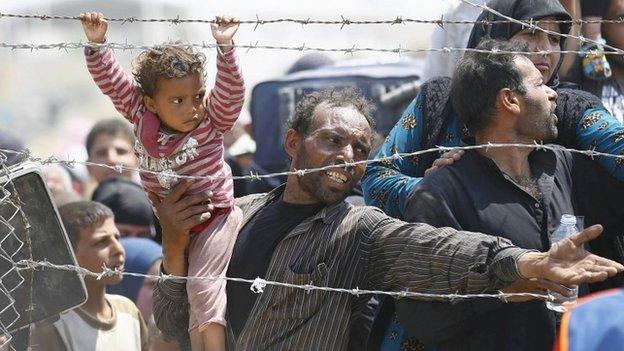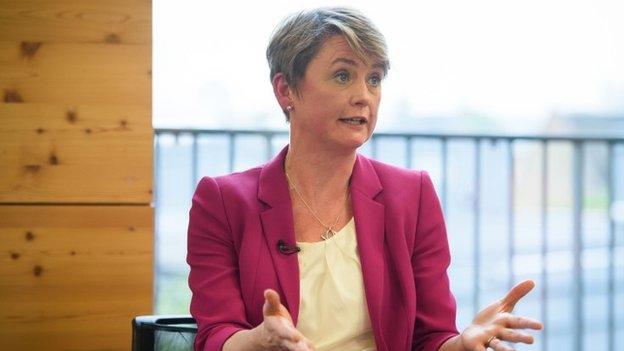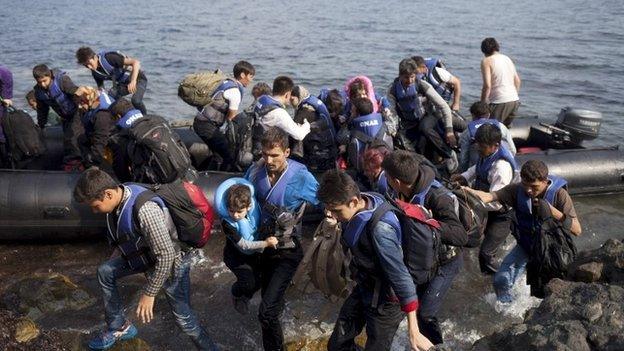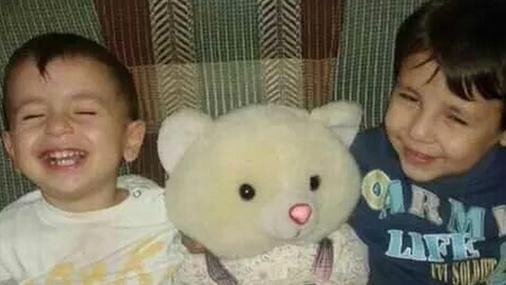Migrant crisis: UK council leaders seek more resources
- Published

Council leaders have called on the government to provide more resources to help them house extra refugees that the UK is planning to accept.
David Simmons from the Local Government Association (LGA) said it was important that councils could provide the services refugees expected.
David Cameron has said the UK will take in "thousands" more Syrian refugees.
Under existing schemes, government financial support for Syrians resettled in the UK lasts 12 months.
Details of Mr Cameron's plans have not been announced, but the Syrians are expected to be taken to Britain under existing schemes, so the 12-month limit on central government support is expected to apply.
After that, costs including health, education and social care will fall to councils.
An exact figure on how many people the UK will take in is yet to be decided, but Mr Cameron made it clear on Friday that the extra refugees would come from camps bordering Syria, and not from among those already in Europe.
'Clear on costs'
Councillor Simmonds, from the LGA's asylum, refugee and migrant task force, told BBC Radio 4's Today programme: "The big challenge is that there's been a lot of well-publicised pressure on our public services, school places, hospital access, housing - in many parts of the country.
"We need to make sure that if people are going to be moved to the UK, that we've a clear idea of what the cost is going to be, to provide the public services that they expect when they come here."
Mr Simmonds said councils in England were already supporting 2,000 unaccompanied refugee children at a cost of £50,000 each year per child.
A further £150m a year was being spent on destitute families whose asylum applications had been turned down, but who remained in the UK, he said.
In other developments:
The SNP says it will use its opposition day debate in the Commons on Wednesday to hold the UK government to account over its stance on the refugee crisis
Migrants are arriving in Austria after Hungary's decision to provide buses for them
A petition calling for Britain to take on more refugees has now received almost 400,000 signatures - four times the amount needed for the issue to be considered for debate by MPs
Calls for the UK to take in more refugees have intensified after the publication of a picture of the body of a drowned three-year-old Syrian boy, Alan Kurdi, washed up on a Turkish beach.
On Friday Mr Cameron said the UK would act with "our head and our heart" on a major expansion of the programme to resettle vulnerable refugees from the camps bordering Syria.

Ms Cooper said there was a "rising sense of moral purpose across Britain"
Earlier Labour's Yvette Cooper said more than 40 councils were ready to offer sanctuary to those fleeing Syria.
The shadow home secretary and Labour leadership candidate said councils had replied within 24 hours to her request for each to accept 10 families.
"There is a real determination and rising sense of moral purpose across Britain to help desperate families. But now the prime minister needs to match it," she said.
Bill Dixon, leader of Darlington Borough Council, which has pledged to take refugees in, said 10 families was "about the right number for a town the size of Darlington".
He said "nine or 10" local families had already volunteered to take refugees in, and 30-40 others had offered money, clothes or other help.
Mr Dixon said the government should fund support for the refugees "for as long as it takes, not try and run away after 12 months".

'Act of kindness'
Craig Marshall, who lives in Darlington, has volunteered to house a family of refugees.
He said taking in refugees was an "act of kindness" and was "the right thing to do".
"The hard step, if you like, is actually getting them, receiving them and taking them and letting them know they're going to be safe," he said.
Mr Marshall said the response he had received when he said he would take in a family of refugees had been a "50/50" split between positive and negative.

Meanwhile, International Development Secretary Justine Greening has dismissed the prospect of Britain joining a proposed EU plan to redistribute the 160,000 migrants already in Europe, arguing that it "simply fuels the people smuggling business".
"It's much smarter and safer to help them directly relocate from refugee camps," she added.
Chancellor George Osborne said resettling refugees had to be part of a wider plan to deal with the crisis.
Speaking at a meeting of G20 finance ministers in Turkey, he said: "You have got to deal with the problem at source which is this evil Assad regime and the Isil [otherwise known as Islamic State] terrorists."
On Friday, BBC Newsnight reported that government sources planned to start making a case in the next week for UK military action in Syria.

How will the plan work?
Mr Cameron's plan suggests he may expand the Syrian Vulnerable Persons Relocation, external (VPR) scheme - although this has not yet been confirmed.
Under VPR, 216 Syrians have been brought to the UK since March 2014.
People arriving in the UK in need of protection usually have to apply for asylum - and if this is granted they get "refugee" status.
But people brought to Britain under VPR have not gone through this process. Instead, they have been granted Humanitarian Protection, a status normally used for people who "don't qualify for asylum" but would be at "real risk of suffering serious harm" in their home country.
Like people granted refugee status, those given Humanitarian Protection can stay for five years, after which they can apply to settle in the UK.
People in both categories have the right to work and access public funds.

Over the past four years nearly 5,000 Syrians (in addition to the 216 taken to Britain under VPR) have been granted asylum in the UK, Downing Street sources told the BBC.
Syrians seeking asylum in the UK
25,771
people applied for asylum in the UK in the year ending June 2015
2,204
were from Syria
-
87% of Syrian requests for asylum were granted
-
216 Syrians have been granted protection under a special scheme to relocate vulnerable people
-
4,980 Syrian asylum seekers and their dependents have been granted asylum since 2011
-
145 Syrian asylum seekers have been removed from the UK since 2011
- Published4 September 2015

- Published4 September 2015
